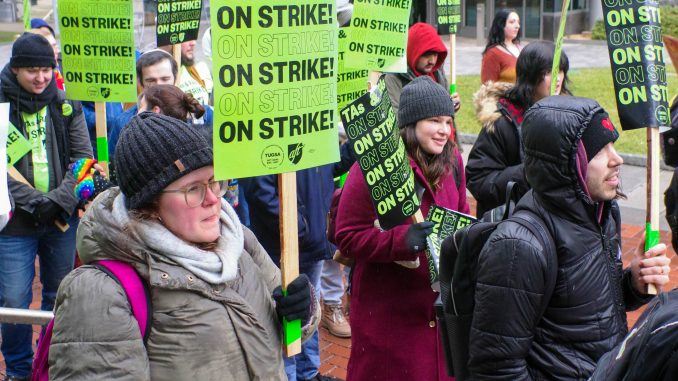
Katie Dow believes that graduate student workers have made the biggest impact on her Temple University education. Dow, a senior psychology major who works closely with a research assistant in her lab, is frustrated that Temple has not reached an agreement with the Temple University Graduate Students’ Association.
“If Temple doesn’t care or invest in our education, or in the livelihood of our grad students, who, at least in my opinion, have made the biggest impact on my education in my four years here, I don’t know what they’re doing and I believe that everyone should get on board and make noise about it,” Dow said.
In response to TUGSA declaring a strike on Jan. 31 in protest of their current wages and working conditions, Temple undergraduate students support the union, but hope that negotiations with the university will be resolved quickly.
TUGSA began negotiating with Temple about a new contract roughly a year ago and the two sides met again on Wednesday.
TUGSA has held rallies around campus following the strike announcement to raise student and faculty awareness for their cause. The rallies often occur in high-trafficked areas, including in front of Charles Library and the Howard Gittis Student Center.
Meghan Obetz, a freshman music major, and her sister Eileen Obetz, a freshman media studies and production major, have noticed that even though they arrive at class on time, they feel awkward maneuvering past the protesters to get to academic buildings.
“I’ve had a couple classes in Tuttleman and then in Gladfelter, and I’ve had to kind of go around them, which I feel bad about because I can’t do anything while I’m going to class,” Eileen Obetz said. “I try to spiritually support them, like will them forward. I’m like, ‘keep doing it, doing great,’ but I’m glad to see them out there.”
Tyler Reester, a senior chemistry major, is using his desire to pursue a career in the education field to relate to TUGSA members and understand how they should be compensated.
“They want to be able to provide good academic environments for their students, and if they’re not getting resources for themselves to be happy, they can’t really produce the same amount of educational benefit for their students, and I’m all for [strong academic environments],” Reester said.
Classes taught by graduate student instructors who chose to strike have been assigned alternative instructors in an effort to continue teaching throughout the strike.
Ali Crosely, a sophomore performance major, is frustrated by Temple replacing the instructors and hopes the protests send a message to administrators.
“I hope this does send a message to Temple and their pay gets higher, because I know a lot of the classes are saying like, ‘Oh, we’ll just replace them,’ but I don’t think that’s the solution, there are people that can’t just be replaced,” said Crosley.
TUGSA has received support from local and national politicians, including United States Vermont Senator Bernie Sanders, who voiced his support for the union in a Feb. 1 tweet. Philadelphia mayoral candidate Helen Gym and U.S. Pennsylvania Senator John Fetterman have also promoted TUGSA’s cause.
Keri Bobeck, a senior psychology major, hopes that the pressure from political leaders will push Temple administration to meet TUGSA’s demands.
“We love recognition towards Temple, and it’s something that’s like if Temple sees that big, political people are fighting for us as well, maybe they’ll fight and actually give us what we want,” Bobeck said.
Although she is disappointed the university hasn’t met TUGSA’s needs yet, Meghan Obetz wants the strike to be quickly resolved.
“I hope it gets resolved quickly and that they just get what they’re asking for, because I feel like, Temple could have dealt with it better, honestly, I don’t think it had to get to this point, the fact that they let it, it’s just a little disappointing,” Meghan Obetz said.



Be the first to comment